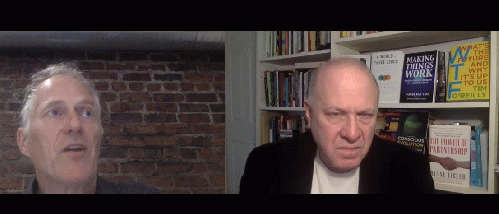Broadcast 12/10/2017 at 10:46 PM EST (22 Listens, 20 Downloads, 2739 Itunes)
The Rob Kall Bottom Up Radio Show Podcast
| Copyright © Rob Kall, All Rights Reserved. Do not duplicate or post on youtube or other sites without express permission. Creative commons permissions for this site do not apply to audio content or transcripts of audio content. | ||||
Tim O'Reilly, the author of WTF; What's the Future and Why It's Up To Us, launched the first commercial website .
He is probably the most influential tech publisher. He's organized incredible conferences bringing together some of the most influential digital leaders, including Tim Berners Lee. He's credited with being one of the Web's earliest evangelists, and with helping create the terms Web 2.0, Open Source and Maker Movement
Rough interview notes- before and during:
You offer a very hopeful vision--with caveats--but very hopeful--that the WTF will be one of incredulity and amazement more than disgust.
You wrote, in WTF, "The future is the outcome of millions of intersecting vectors, which add up in unexpected ways. The art is to pick out important vectors and weave a net from them in which to catch a view of the future.
Please start with a story that offers hope.
What's the main goal of your book. What do you want readers to take away?
You offer great maxims throughout the book. One is that if the future is here, already, but not evenly distributed yet, find seeds of that future, study them and ask yourself how things will be different when they are the new normal. What happens if this trend keeps going.
You studied Classics at Harvard, You taught at Esalen. A number of friends have taught there, over the years. What did you take away from those experiences?
You say, "Work on stuff that matters." You've really thought about this. What matters?
And I'll through in that you use a quote from Nick Hanauer, "Solve the biggerst problem you can."
You have a list of items. P352
I love your observation that "moral choice not intelligence or creativity is our greatest asset."
You've said that innovations starts not with entrepreneurs but with people having fun.
You refer to algorithms gone wrong, which can have potentially catastrophic consequences. One example was certainly centralized, algorithm driven mortgage lending. But you're focusing more on tech firms.
There's a real Bottom up aspect to algorithms. Can you talk about that?
Government as a platform?
Platform cooperativism?
You write that when you started online, with your first commercial website, there were 200 websites. Now, your book says, there are 250 billion, and 30 trillion pages.
You claim that technology will not end jobs. Explain your thinking.
You observed to Tech Crunch, commenting on excess focus on shareholders, that since Apple is the most profitable company on the plan they could be paying less attention to shareholders and paying higher salaries to their store workers--AND bring manufacturing to the US--and you have a similar take on Walmart.
Artificial intelligence Algorithms
Augmented Workers vs unaugmented workers
Open Source, Big Data, collective intelligence
You recently organized a conference, The Next Economy,
Economics--the caring economy, the creative economy"
Questions we'll tackle include
- Is human-machine cooperation changing the way we work?
- How are AI and algorithms making it possible to rethink fundamental workflows and transform long-accepted business practices?
- How do we put people to work solving the world's hardest problems?
- What opportunities can businesses find in revitalizing the cities in which they operate?
- Why human originality and creativity is the common thread in many great cities and social networks. How should we pay for this creativity?
- What lessons can we learn from 21st-century network-centric organizations?
- How are AI and "bots" bringing new opportunities into the enterprise?
- Are we measuring the right things? What can we learn about policy and regulation by watching technology companies measure and manage their products?
- How do we manage bias in algorithms?
- What surprising new jobs emerge as the definition of work evolves? Which ones are going to scale?
Size: 83,510,461 -- 0 hrs, 58 min, 0 sec










